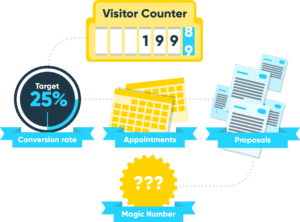We all love seeing numbers go up, there’s something undeniably tantalising about it.
However, it’s easy to get swept up in celebrating the wrong metrics – stats that aren’t actually helping you to meet your goals.
In this blog, the first of our ‘Marketing Mistakes’ series, we’ll dive into vanity metrics, discussing what they are and how to avoid them.
And, before we get started, don’t worry, we’ve all been a victim of vanity metrics at one time or another, it’s very easy to do!
What are vanity metrics?
The term ‘vanity metrics’ can be difficult to define, as it varies from client to client.
Generally speaking, a vanity metric is a measurable statistic that doesn’t have a direct impact on your growth, or doesn’t lead to you meeting your set targets.
For example, if your goal is to get more qualified leads for your sales team, then having page views as a key metric of success probably doesn’t help you that much – it’s a vanity metric (looks good on paper, doesn’t deliver tangible results).
Sure, it’s great to get lots of people clicking your links and viewing your website, but if they’re not converting, then it’s time to consider why.
It’s very easy to celebrate big numbers, it’s much harder to consider what you need to do to improve.
Why are vanity metrics such an issue?
Good marketing relies on good data.
Decisions are made based on data, which means that if you’re focusing on the wrong things, you’ll make the wrong decisions.
Identify where your data is coming from, assess whether the metrics you’re focusing on are right for your goals, and make sure that you’re using the best tools to measure (we prefer HubSpot, but use what works for your business).
How to avoid vanity metrics
So, it’s pretty clear that vanity metrics are a pretty big marketing mistake that you’d do well to avoid…
…But how can you avoid them?
Here’s a few key steps to help you avoid accidentally relying on vanity metrics:
1. Decide your goals
This is the only thing that you, and you alone, can decide.
Perhaps you’re looking to drive more sales, or maybe you’re trying to build awareness of a new product or service; you may even be looking for business partners, or planning your exit strategy – whatever your goals are, it’s essential that you clearly define them right from the start.
Not only should you define them, but you should also quantify them to the best of your ability.
For example:
I want to drive more leads!
^ This is a rubbish goal, because how do you know if you’ve achieved it? However:
I want to drive 15 qualified leads per month for X service.
^ That’s a little better, as each month you can assess how close to your goal you got, what went well and what needs to change. It also helps with our second point…
2. Be strict on what metrics you assess
Once you’ve got your goal, it’ll be clearer what metrics are going to be important to you.
As mentioned earlier, this varies from business to business. A vanity metric for you could be incredibly important to another, so it’s essential you go into this with an open mind.
A good digital marketing agency will be able to advise on what you ought to be focused on (we’ve been doing this for a long time, we’ve seen and made the mistakes already!).
For example, if you’re looking to build awareness of a new product, you’ll want to measure:
- Impressions across website, socials and more
- Interactions (what are people saying about your product?)
This will help you know how many eyes you’ve had on your comms. If you’ve managed to gather contact details, it’ll also allow you to continue to market to this audience. Remember: marketing takes time, it’s not always about a quick sale!
Another example would be if you’re looking to grow your SME, but marketing hasn’t worked in the past. The metrics you’ll want to focus on would more likely be:
- Number of qualified leads
- What marketing methods helped bring those leads in?
- Are the leads that are coming in of the right size/fit?
Sure, it’s good to know how many impressions you’re getting, and how many page views your blogs are driving, but if they’re not leading to conversions, are those metrics worth focusing on? No.
3. Work out your magic number
Your magic number is essential; all of the above and your sales success link to it.
You should know the number of web visits you need to get the number of appointments you need, which leads to the right number of proposals to get you the sales you require to grow.
In other words, have you got a consistent conversion rate? If so, you can accurately predict the metrics that you need to get the sales you want.

4. Assess regularly
Metrics that aren’t important for you now may be more important in the future.
As your needs change, it’s essential that you reassess whether your goals should change, too. You may find that, surprise surprise, the metrics you’re measuring also need to change.
Marketing is an ongoing and very fluid process, so it’s essential that you take the time to sit down and reassess regularly.
5. Change things that aren’t working
“The definition of insanity is doing the same thing over and over and expecting different results.”
According to historians, Albert Einstein didn’t actually say the above, but it’s still an important message!
As frustrating as it is, sometimes things just don’t work out as you’d planned, and that’s okay, as long as you learn from it and quickly move on. Wasted time is wasted budget, and if you’re not seeing the data to support your actions, then you need to chart a different course.
Changing up your marketing can be difficult, especially if you don’t have dedicated specialists handling it for you. Need some help? Give us a shout.
6. Involve your customers/clients
The best data comes directly from your customers.
If you’ve got a client or customer who you’ve got a good rapport with, ask them what attracted them to you in the first place, how did they find you and why did they choose you over a competitor?
Learn all about their interests, both professionally and personally. This can help you build a buyer profile that you can target in future campaigns.
Boost your digital marketing success today
Vanity metrics are a common pitfall that many businesses, especially SMEs, fall into.
If you don’t have a dedicated team of marketers, it’s incredibly hard to adapt your marketing strategy and to ensure you’re not wasting time and budget.
The solution? Find the right marketing partner – a partner like Catalyst.
We’re a data-driven, commercially-focused digital marketing agency. We specialise in taking data and turning it into quality marketing strategies that deliver results.
Get in touch today for a no-obligation chat about your goals, and how we can help you get there.


